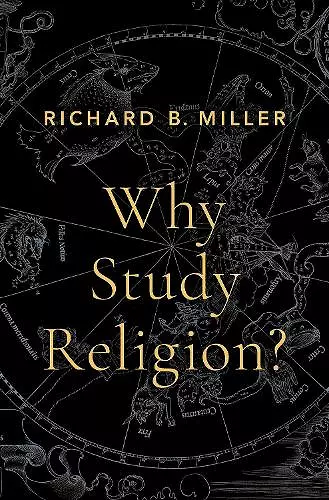Why Study Religion?
Format:Hardback
Publisher:Oxford University Press Inc
Published:12th Jan '23
Should be back in stock very soon

Can the study of religion be justified? Scholarship in religion, especially work in "theory and method," is preoccupied with matters of research procedure and thus inarticulate about the goals that motivate scholarship in the field. For that reason, the field suffers from a crisis of rationale. Richard B. Miller identifies six prevailing methodologies in the field, and then offers an alternative framework for thinking about the purposes of the discipline. Shadowing these various methodologies, he notes, is a Weberian scientific ideal for studying religion, one that aspires to value-neutrality. This ideal fortifies a "regime of truth" that undercuts efforts to think normatively and teleologically about the field's purpose and value. Miller's alternative framework, Critical Humanism, theorizes about the ends rather than the means of humanistic scholarship. Why Study Religion? offers an account of humanistic inquiry that is held together by four values: Post-critical Reasoning, Social Criticism, Cross-cultural Fluency, and Environmental Responsibility. Ordered to such purposes, Miller argues, scholars of religion can relax their commitment to matters of methodological procedure and advocate for the value of studying religion. The future of religious studies will depend on how well it can articulate its goals as a basis for motivating scholarship in the field.
This brilliant book is both a powerful criticism of the current state of religious studies and an impassioned plea for an entirely new approach.... Essential. * CHOICE *
Religious studies scholars often struggle to articulate the value of what they do. Why Study Religion? offers a robust vindication of the academic study of religions that will be of value to any scholar (or any dean)looking to see the future of the humanities. * Kevin Schilbrack, Professor of Religious Studies and Department Chair, Appalachian State University *
Miller's book is a major contribution to the critical study of leading methods in the field of Religious Studies. But the heart of the book, and where it really shines, is in its extension of the 'normative turn' in religious studies. Miller wants us to look beyond our obsession with method and to leave behind the scholarly ideal of 'value neutrality' and instead ask ourselves why we should study religious people, ideas, practices, and artifacts. His own answer to this question, which frames religious studies as a form of 'critical humanism,' is as persuasive as it is provocative. It is an answer that takes us beyond the study of religion to the humanities and to the question of what it is to be a thinking, responsible actor in the world. * Tyler T. Roberts, Professor of Religious Studies, Grinnell College *
Miller has written a thoughtful, creative, clear, and well-researched book that offers an important contribution to the field of religious studies. It is wide-ranging, brimming with arguments, and attuned to detail. What we have here is the most robust, intellectually serious, and comprehensive "meta-disciplinary" work in religious studies to date. * David Decosimo, Associate Professor of Theology, Boston University *
Religious studies scholars often struggle to articulate the value of what they do. Why Study Religion? offers a robust vindication of the academic study of religions that will be of value to any scholar (or any dean) looking to see the future of the humanities. * Kevin Schilbrack, Professor of Religious Studies and Department Chair, Appalachian State University *
Miller's book is a major contribution to the critical study of leading methods in the field of Religious Studies. But the heart of the book, and where it really shines, is in its extension of the 'normative turn' in religious studies. Miller wants us to look beyond our obsession with method and to leave behind the scholarly ideal of 'value neutrality' and instead ask ourselves why we should study religious people, ideas, practices, and artifacts. His own answer to this question, which frames religious studies as a form of 'critical humanism,' is as persuasive as it is provocative. It is an answer that takes us beyond the study of religion to the humanities and to the question of what it is to be a thinking, responsible actor in the world. * Tyler T. Roberts was Professor of Religious Studies, Grinnell College *
There are many reasons to admire this book and many ways in which scholarship might benefit from it. Miller's critical engagements with the field's prominent methodologies are well executed and insightful. * Andrew Dole, Journal of the American Academy of Religion *
ISBN: 9780197566817
Dimensions: 166mm x 242mm x 33mm
Weight: 644g
384 pages